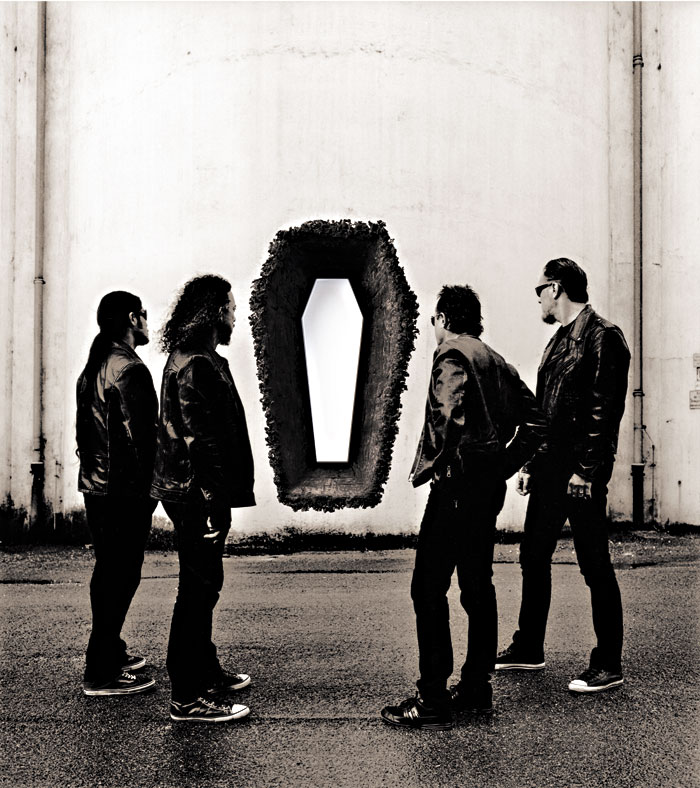When I was 13 or so, my metalhead peers began passing around copies of a tape entitled Metal Up Your Ass, with a cover that featured a crude drawing of a fist emerging from a toilet, wielding a knife. It was a totally tame graphic by today’s standards, but utterly disturbing and fascinating for a young teenage girl growing up in Tacoma.
Metal Up Your Ass was the collection of demos by Metallica that would eventually turn up in vinyl and cassette form under the equally antagonistic title of Kill ‘Em All, released in 1983 on Megaforce Records. As someone raised on the raw, muscular New Wave of British heavy metal, and who was bored senseless by some of what was beginning to pass for metal at that time (Quiet Riot had just gone to #1 with “Cum on Feel the Noize”), Metallica was pretty much the most exciting thing I had heard since my father first handed me a Johnny Cash record. By the time Ride the Lightning dropped in 1984, I was a full-tilt, obsessive fan.
They didn’t sing about how much they were getting laid or how glamorous their lives were; they wrote songs about the ravages of war and the hypocrisies of the death penalty, and generally seethed with a tense fury that played both sides of the fence, delivering leftist diatribes one moment and assuming a devil’s-advocate stance the next. I found it frightening and morally suspect, but refreshingly honest.
In 1986, the day their third record, Master of Puppets, was released, my friend Derek skipped out of class early to get his hands on a copy, and a bunch of us met up in a wooded area near our high school. Derek had a boombox with him, some resourceful fellow had the weed, and all of us were so on edge to hear the new material that I remember nervously breaking twigs in my hands over and over again in anticipation. As soon as the opening riff to “Battery” galloped out of the gate, I was ecstatic. Everything I already loved about the band had been amplified, literally and figuratively. Bassist Cliff Burton had never sounded so commanding and creative, and rarely had a metal record delivered at such breakneck speed been so beautifully sequenced and artfully executed. I’m pretty sure we listened to it three times all the way through before we realized it was getting dark in the woods.
Sadly, that was the band’s high-water mark. Within months, Burton was killed in a horrific bus accident. The Bay Area band was permanently derailed away from their original sound and began a creeping creative death march towards more commercially lucrative pop pastures. Then in 1991 came the so-called “Black” album (delineated as such because though it was eponymously titled, the mostly monochromatic artwork made it difficult to tell what the hell exactly you were supposed to call it). It was a clean, comfortable, and easy-on-the-ears hard rock album with plenty of catchy hooks, sing-along anthems, and a structurally sound pop skeleton. It was also heartbreakingly bland and ball-less if you were a fan of Metallica’s thrash roots and curmudgeonly edge. While a sizable legion of fans shared my sentiments exactly, it really didn’t matter in terms of commercial success: the Black album went on to sell 22 million copies and continues to be the best-selling recording of their career. I gave up on Metallica and went on to discover punk rock, which was just the comfort food I needed after such a disappointing decline.
That was nearly 20 years ago, so when word started trickling out that Metallica’s new, Rick Rubin–produced record was being trumpeted as a return to form, I was highly skeptical. It was a joyous shock to discover that Death Magnetic was indeed infused with many of the same elements that made me fall in love with them the first time. Starting your record with a faux heartbeat that gives way to watery, finger-picked minor chords could be both clichéd and prematurely self-aggrandizing, but in the case of opening track “That Was Just Your Life”, it’s a benign preamble to an unexpected onslaught of classic Metallica. Given the budgets these cats now possess and the obvious magic that Rubin appears to wield, I’m not sure who to congratulate, but both the tension and flourish are back. If you’ve ever cared about what Metallica used to be, you should definitely give your ears the chance to absorb where they are now. Furthermore, if you are going to the band’s KeyArena show this coming Monday, December 1, be sure to show up early to catch the opening act. The Sword are arguably the best new (not nu) metal band working today—and one that clearly studied those early Metallica texts with great reverence.








